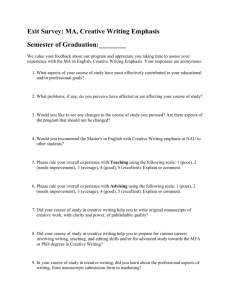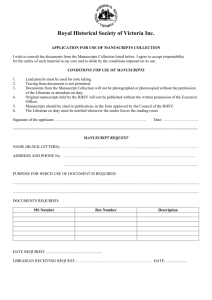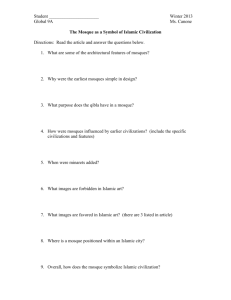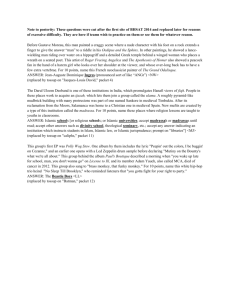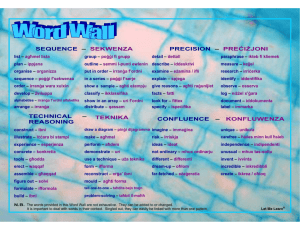Nil Sari Speach - International Society for the History of Islamic
advertisement
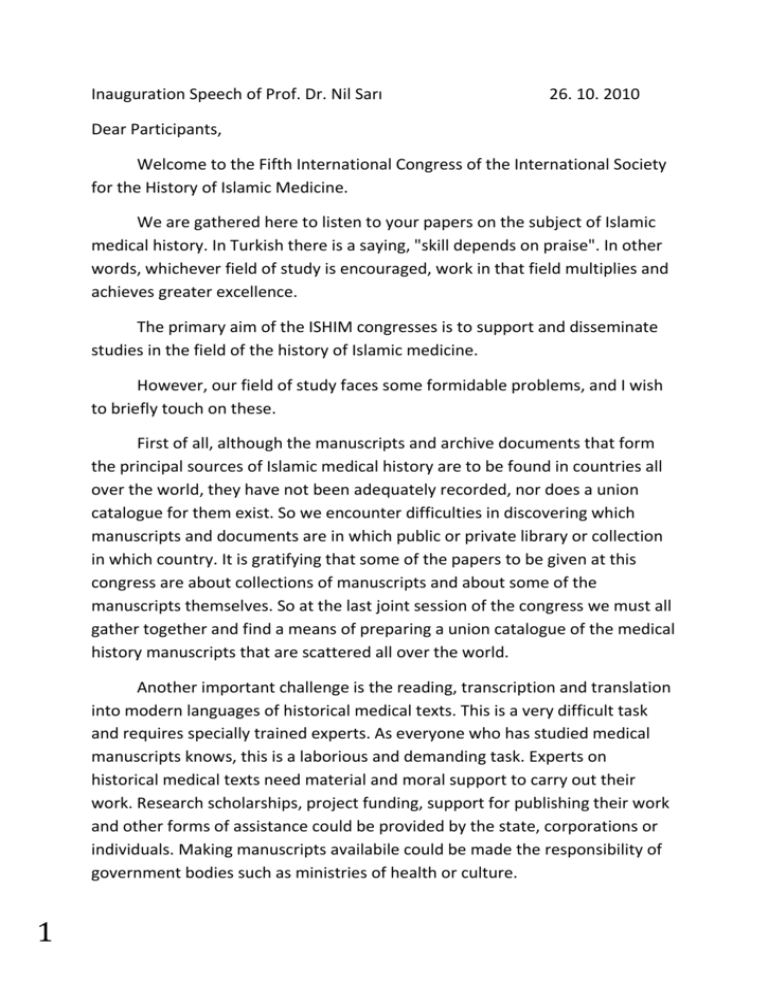
Inauguration Speech of Prof. Dr. Nil Sarı 26. 10. 2010 Dear Participants, Welcome to the Fifth International Congress of the International Society for the History of Islamic Medicine. We are gathered here to listen to your papers on the subject of Islamic medical history. In Turkish there is a saying, "skill depends on praise". In other words, whichever field of study is encouraged, work in that field multiplies and achieves greater excellence. The primary aim of the ISHIM congresses is to support and disseminate studies in the field of the history of Islamic medicine. However, our field of study faces some formidable problems, and I wish to briefly touch on these. First of all, although the manuscripts and archive documents that form the principal sources of Islamic medical history are to be found in countries all over the world, they have not been adequately recorded, nor does a union catalogue for them exist. So we encounter difficulties in discovering which manuscripts and documents are in which public or private library or collection in which country. It is gratifying that some of the papers to be given at this congress are about collections of manuscripts and about some of the manuscripts themselves. So at the last joint session of the congress we must all gather together and find a means of preparing a union catalogue of the medical history manuscripts that are scattered all over the world. Another important challenge is the reading, transcription and translation into modern languages of historical medical texts. This is a very difficult task and requires specially trained experts. As everyone who has studied medical manuscripts knows, this is a laborious and demanding task. Experts on historical medical texts need material and moral support to carry out their work. Research scholarships, project funding, support for publishing their work and other forms of assistance could be provided by the state, corporations or individuals. Making manuscripts availabile could be made the responsibility of government bodies such as ministries of health or culture. 1 There is no medical history dictionary to assist today's researchers with the terminology they encounter in medical history texts. Historical medicine covers most of what we now describe as alternative medicine. In other words it is based on a theory entirely different from that of conventional modern medicine, and its diagnostic and treatment methods are very different. Therefore medical historians who are specialists in Islamic medicine, experts in languages like Arabic, Persian and Turkish, and medical specialists need to work together to prepare a dictionary that gives the correct definitions of the medical terminology used in medical manuscripts. We could form an international scientific committee for this purpose at the closing session. There is another very important subject that requires cooperation between researchers and writers. As you will see in the booklet of abstracts in your hand, the names of people, books and places are spelt in many different ways. The variations are so great, that sometimes one is unsure which person or which book are meant. A committee of linguistic experts should be set up to tackle this problem, and standardise the spellings of proper names in English language papers. A committee of this sort could be formed at this meeting, and their names announced in the ISHIM journal. There is another matter on which writers on the subject of Islamic medical history need to agree. Islamic medical history is not the sole property of Arabs, Iranians or Turks. The most scientific approach would be focus on individuals and their works and to classify them according to the state or states whom they served; for example Abbasid, Umayyad, Karakhanid, Seljuk or Ottoman. This would mean that major figures like Ibni Sina, to which every national lays claim, would be rescued from the position of being both Turkish and Iranian, and at the same time Arab and even Russian, and so on. Also Islamic medicine was not just the work of Muslims; many Christian and Jewish physicians also wrote books. Therefore styling historic personages according to the name of the state under which they lived would prevent the confusion deriving from attempts to identify them according to national identity. Another difficulty is the failure to undertake sufficient new research. We must not keep repeating one another. For example, some of the abstracts submitted to this congress contained information with which we are all familiar and did not present any new interpretations. Some of these were rejected. Our 2 objective should be to generate new knowledge. With this in mind there is an urgent need for a bibliography of published articles and books, and graduate theses (whether published or not) on the subject of Islamic medical history. A committee consisting of the librarians and archivists who are among us at this congress could undertake the task. Perhaps the ISHIM editors could be of assistance in this regard. International organisations could be of use here, and the ISHIM executive council could help in this respect. For example, in the matter of funding, cooperation with internationally respected organisations like the Islamic Conference might be possible. Apart from these there is a problem which concerns every individual writer. Since May I have been reading and evaluating all the abstracts that have been submitted. It is absolutely essential that we be understood. Today knowing English is necessary for different nations to understand one another. If we fail to convey our knowledge and ideas to the world of science in accurately written language, all our work goes for nothing. So if we want Islamic medical history to take the place that we believe it deserves in the history of world medicine, we must produce texts that are accurately written. That is your responsibility. If your foreign language knowledge is inadequate, then you should have your papers translated by people whose knowledge can be relied on. There is another important aspect of this meeting that closely concerns today's world of science. Islamic medical history, like other historical medical systems, contains the accumulated knowledge of centuries. The pharmaceutical treatments mentioned in medical manuscripts were used for centuries. These historical pharmaceuticals were not the result of controlled experiments in laboratories and clinical trials. They were used directly on patients and physicians then observed their beneficial and harmful effects. Beneficial and harmful medicines were identified empirically in the natural course of clinical treatment. Now scientists have begun to make use of this body of traditional knowledge acquired over centuries. Drugs and pharmaceutical formulas used in the past are being investigated and tested in laboratories and clinics. At this congress you will listen to papers about modern studies of old medicines. In a final session a panel of pioneering scientists who 3 are not medical historians but who are making use of the wisdom of medical history will discuss this subject. While we are all together for two days under the roof of Istanbul University let us take this opportunity to learn as much as possible from one another. Let us make use of this gathering to pave the way for further studies; and at the closing session let us all decide where we will meet next. We await proposals from candidate countries. We hope that the social events held at the end of each day of intensive work will refresh you. Finally we should not forget that a large scale congress like this in which the speakers have been invited as guests was only possible with financial support, and we present our most sincere thanks to our sponsors for their help. Once again I welcome all of the participants and wish you all a successful congress. 4

